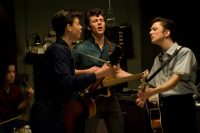Read our exclusive report from the preview screening held at Abbey Road’s studio two.

John Lennon’s early years have been well documented in books, but rarely given a dramatic treatment. Screenwriter Matt Greenhalgh, who wrote the script for the 2007 Joy Division film Control, brings to life the finer details of Lennon’s life: the harmonica given to Lennon by his Goon Show-loving uncle George; the first guitar ‘guaranteed not to split’; the struggles to gain his attention from Mimi and Julia.
The Liverpool of the 1950s is a city of teddy boys with flick knives, of Cunard Yanks with the latest vinyl from America, of endless excitement at hearing new sounds on the airwaves. It also represents a time of post-war drabness, of fumbling sex and dreams of escape – a salvation to which rock ‘n’ roll offers the key.
The film hinges on Lennon’s reignited relationship with his mother Julia, having grown up in his aunt’s austere household, and the conflicting influence of the two women. Julia’s love of the new music, of dancing, sex and parties, fill the teenage Lennon with intrigue and excitement. She teaches him to play the banjo and encouraging his creativity, and both share a love of dancing, smoking and drinking while Mimi vainly attempts to keep him focused on his studies.
Once Mimi is persuaded to part with the money for a guitar, Lennon never looks back. A group of musicians are hastily assembled from schoolboys at Quarry Bank High School, live performances follow in front of hungry Liverpool audiences, and dark days give way to longer nights of music and dancing.
The flirtatious, confused relationship between Lennon and his mother comes to the fore: was she a friend, a returned lover, or a parent? The pair share kisses, touch, and look yearningly at one another, with neither quite sure where to draw the line. “I love you, you’re my dream,” she tells him during a day out in Blackpool, before flirting with sailors to make him jealous.
The soundtrack consists of rock ‘n’ roll classics, some re-recorded by the actors playing the Quarrymen, with additional music by Goldfrapp and a full orchestra. Lennon’s voice itself isn’t heard until the end, when a session outtake of the 1970 song Mother closes the film.
Heading a strong ensemble cast, Aaron Johnson is convincing as Lennon, and Anne-Marie Duff and Kristin Scott Thomas turn in reliably powerful yet understated performances. The actors who play Paul McCartney (Thomas Sangster) and George Harrison (Sam Bell), however, neither look nor sound particularly authentic. The impact of certain key scenes, such as when the camera pans to McCartney watching Lennon fronting the Quarrymen for the first time, is lost if the viewer doesn’t realise who is being portrayed.
There is also little indication of the dangerous, charming, monstrously witty and devastatingly sarcastic character Lennon was as a teenager. He is shown as an unruly schoolboy with a passing interest in drawing, but with little of the boundless creativity that filled his days and nights. It’s notable when a throwaway line, a waitress’ dismissal of Mimi when asked for Earl Grey tea – “You must have us confused with Buckingham Palace, love; it’s easily done” – eclipses anything given to the leading actors.
But, of course, Beatles fans are a notoriously picky bunch, and it’s inevitable that many viewers will be keenly looking for faults. In truth there’s very little wrong here, although McCartney’s suggestion that “We should write our own material; that way you don’t get screwed by the record companies” clumsily suggests a degree of knowing well beyond the teenage Beatles’ scope.
And yet this is a worthy companion piece to Iain Softley’s Backbeat, where The Beatles’ story continues in Hamburg. Nowhere Boy a moving account, sensitively handled and emotionally powerful. This won’t be the last time Lennon’s life is dramatised, but few other attempts will manage to do so with such tenderness and empathy.






just saw it – it was entertaining – no big news – rented the dvd – not worth seeing in a theater but worth seeing once.
I love this movie. It grows on you with repeated viewings. I read Lennon’s biographies after I saw it and it’s very faithful to his story. I think the actors who play McCartney and Harrison are just fine. Sam Bell captured Harrison’s precocious cockiness and Thomas Sangster is lovely as McCartney. In both Backbeat and Nowhere Boy, I feel like when McCartney shows up something clicks in place and grounds the film.
I had the hardest time with Aaron Johnson, because physically he seems more imposing than Lennon. I appreciate his performance more though, on repetition. I do agree they soft-pedal Lennon a bit — he’s funny in this film but in life it seems he was hilarious.
I really find it a loving kind of tribute — only deep attention to Lennon’s roots could have produced it. Liverpool looks fantastic, and even the line by the waitress mentioned above gives you a sense of the culture they grew up in. I recommend giving the film a chance, and getting over the audacity of the filmmakers. It’s one of my favorite movies now.